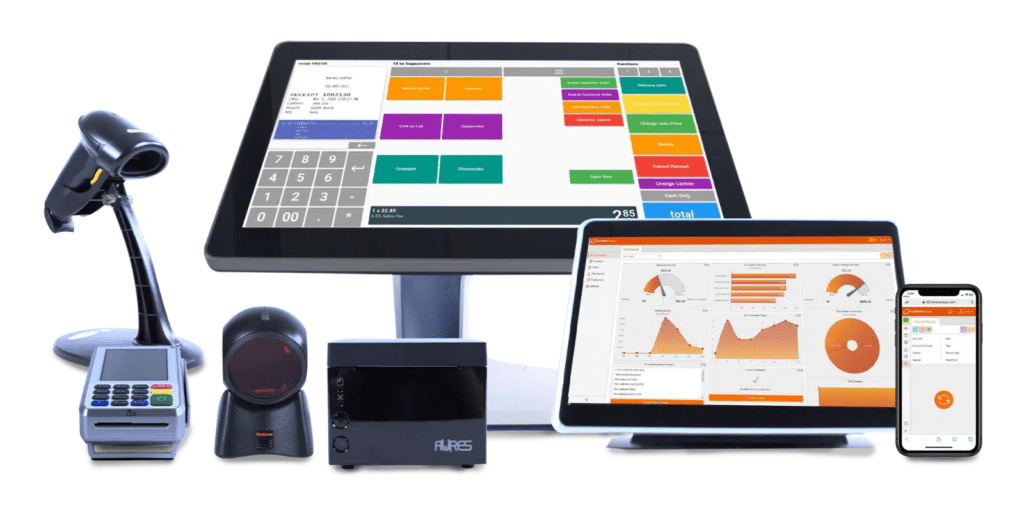Thinking about becoming your own boss but don’t want to start from scratch? Starting a franchise is one of the most proven paths to business ownership, combining the independence of entrepreneurship with the support of an established brand.
This guide covers everything—from definitions to startup steps—so you can confidently launch your own franchise. We’ll also highlight cost breakdowns and common mistakes to avoid. Let’s dive in.
Key Takeaways:
- A franchise is a type of business setup where the owner of a brand (the franchisor) lets another person or group (the franchisee) use their brand name to run a business.
- Starting a franchise involves several steps, from researching industries to signing agreements and getting insured.
- Franchise costs vary, including initial franchise fees, legal expenses, and ongoing royalties.
What Is a Franchise?
Before we get started, it will help to understand exactly what a franchise is and who the key players are in a franchise model. Let’s delve into definitions so you can understand how this setup works.
Franchise
A franchise is a business that allows other people or companies to sell its goods or services while using its name, image, brand, logo, or any of its intellectual property in exchange for fees and royalties. It allows the business owner to run a business using a proven system an branding.
The Franchisor
The franchisor is the original business owner who grants rights to use its business model and intellectual property. In return, they provide training, marketing support, and operational guidance.
The Franchisee
The franchisee is the entrepreneur who invests in the franchise, operates under the franchisor’s brand, adheres to the established rules and systems, and benefits from ongoing support.
Types of Franchise Models
- Product Distribution Franchise (e.g., Coca-Cola): focuses on supplying products to be sold.
- Business Format Franchise (e.g., McDonald’s): includes a complete business model.
- Management Franchise: the owner manages the business but doesn’t operate it.
- Conversion Franchise: an existing business is converted into a franchise outlet.
Franchise vs. Starting Your Own Business: What’s the Difference?
The differences between a chain and a franchise are plenty. This table provides an overview of the key differences:
Feature | Franchise | Independent Business |
Brand Recognition | Built-in | Must create from scratch |
Startup Costs | Typically higher | Can be lower (varies) |
Operational Support | Provided | Must DIY |
Creative Freedom | Limited | Full control |
Success Rate | Typically higher | More variable |
Ongoing Fees | Royalties/ad fund | None |
Start a Franchise in 7 Simple Steps
Starting a franchise may seem overwhelming, but breaking it into steps makes it manageable. Here’s how to go from an idea to opening day in 7 straightforward steps:
Step #1: Choose the Right Industry
Before you commit to a franchise, explore industries that align with your interests, experience, and market trends. Whether it’s food service, cannabis, retail, or an amusement park, choosing the right sector will set you up for long-term engagement and growth.
Step #2: Research and Compare Franchise Options
Compare brands using franchise directories and guides. Assess initial investment requirements, training programs, brand reputation, and ongoing support provided by the franchisor.
PRO TIP!
Be sure to read franchise disclosure documents (FDDs) carefully—they provide essential information about the franchisor, the franchise system, and the franchisee’s obligations.
Step #3: Contact Franchisors and Ask Questions
Reach out to franchisors with a list of prepared questions. Ask about profit margins, marketing support, tech systems, territory protection, and typical startup timelines. This is your chance to assess how hands-on and transparent they are.
Step #4: Evaluate the Franchise Market
Analyze the competitive landscape in your chosen location. Identify existing franchise presence, demand for the product or service you will provide, and potential saturation.
Step #5: Secure Funding
Use a combination of personal savings, loans, or SBA assistance to fund your franchise. Prepare a business plan that outlines startup costs, expected revenue, and break-even projections to help secure said financing.
Step #6: Attend Discovery Day
Many franchisors host “Discovery Days” where you meet key team members and see the business in action. It’s an essential step to assess cultural fit and get final questions answered before signing up.
Step #7: Sign the Franchise Agreement and Set Up Shop
Once approved, you’ll sign the agreement, get insured, and begin setting up your location. This includes hiring staff, installing systems, and launching local franchise marketing strategies.
How Much Does Starting A Franchise Cost?
Starting a franchise requires upfront capital and a plan for recurring costs. Below, we break down the typical expenses, including one-time and ongoing fees, you’ll encounter when buying and opening a franchise.
The Franchise Fee
The franchise fee gives you the right to operate under the franchisor’s name and system. It often includes training, onboarding, and initial support.
Typical range:
$10,000 – $100,000
Initial Setup Costs
Here’s what you’ll need to pay upfront, before opening your franchise:
⮕ Build-Out & Real Estate
These include costs to lease or buy a physical space, renovate to brand standards, and install necessary fixtures.
Typical range:
$50,000 – $250,000
⮕ Equipment & Technology
This includes kitchen or retail equipment, retail management software, hardware, and business tools like franchise POS systems for inventory management and marketing.
Typical range:
$20,000 – $150,000
⮕ Initial Inventory
You’ll need products to stock your business for launch. The cost of inventory will vary by industry.
Typical range:
$10,000 – $50,000
⮕ Licensing, Permits & Insurance
Depending on your business type and location, you’ll need operational licenses and liability insurance.
Typical range:
$1,000 – $10,000
⮕ Signage & Branding Materials
These fees include exterior and interior signs, branded uniforms, and decor—all the things to make your business visually align with franchise standards.
Typical range:
$5,000 – $25,000
⮕ Legal & Consulting Fees
You’ll have to pay for legal review of franchise agreements, accounting, and business consulting.
Typical range:
$2,000 – $10,000
Ongoing Costs
Like any business, you will have to pay up monthly for certain essential tools and processes. Those include:
⮕ Royalties
Most franchisors charge a percentage of your gross revenue
Typical range:
4% – 10% of monthly revenue
⮕ National Marketing Fund
Some brands require contributions to a shared marketing fund.
Typical range:
1% – 4% of monthly revenue
⮕ Local Advertising
You’ll also be responsible for a minimum spend on local marketing campaigns.
Typical range:
$500 – $3,000/month
⮕ Ongoing Tech Fees
Don’t forget your ongoing payments like POS system SaaS subscriptions, and other digital franchise tools!
Typical range:
$100 – $500/month
Franchise Startup Expenses: A Summary Chart
Expense Category | Estimated Cost Range | Cost Type |
Franchise Fee | $10,000 – $100,000 | One-time |
Real Estate / Build-Out | $50,000 – $250,000 | One-Time |
Equipment & POS | $20,000 – $150,000 | One-Time |
Inventory | $10,000 – $50,000 | One-Time |
Licenses & Insurance | $1,000 – $10,000 | One-Time |
Signage & Branding | $5,000 – $25,000 | One-Time |
Legal & Consulting | $2,000 – $10,000 | One-Time |
Working Capital | $25,000 – $100,000 | One-Time |
Royalties | 4%–10% monthly revenue | Ongoing |
National Marketing | 1%–4% monthly revenue | Ongoing |
Local Advertising | $500–$3,000/month | Ongoing |
POS & Tech Tools | $100–$500/month | Ongoing |
Franchise Financing Options
You have options when securing financing to open up your franchise location. Those options include:
- SBA Loans: Government-backed loans designed for small business owners with flexible terms.
- Franchisor Financing: Some brands offer internal financing or deferred payment programs.
- 401(k) Rollover (ROBS): Use retirement funds tax- and penalty-free to invest in a franchise.
- Traditional Bank Loans: Line of credit or business term loan with a set repayment schedule.
- Investors or Crowdfunding: Secure capital from angel investors, friends, family, or the public.
Common Mistakes to Avoid
Even with a proven business model, launching a franchise comes with pitfalls. Avoid these common mistakes that can derail your investment, drain resources, or lead to preventable legal and financial setbacks.
Mistake #1: Skipping due dilligence
Failing to thoroughly investigate the franchisor, local market conditions, and competitive landscape can lead to poor location selection, unrealistic profit expectations, or signing with a weak brand. Ask tough questions and read the FDD carefully.
Mistake #2: Underestimating total costs
Many new franchisees focus only on the franchise fee and build-out, overlooking ongoing costs like royalties, payroll, insurance, local marketing, and technology. Failing to plan for these expenses can strain your cash flow early on.
Mistake #3: Ignoring franchisor support limitations
Not all franchisors offer hands-on help. Some only provide initial training, leaving marketing, hiring, and operations up to you. Be clear about what support is provided and what you’ll need to handle independently.
Why Your Franchise Needs a Strong POS System?
A powerful and intuitive POS system is not just a backend necessity—it’s a critical driver of your franchise’s long-term success. Franchise operators rely on a scalable POS platforms to unify operations across all locations, track KPIs in real time, and reduce the many errors caused by manual processes.
With the right POS system, your franchise can:
- Track sales and inventory in real-time across all locations
- Automate complex royalty calculations and reporting
- Monitor employee performance and sales productivity
- Integrate loyalty programs and localized marketing efforts
- Ensure cloud-based security and access from anywhere
Use KORONA POS To Better Manage Your Franchise Business

From real-time analytics to multi-store inventory management, KORONA POS empowers franchise owners with powerful tools to streamline every facet of their business while reducing waste and building profit. Whether you’re opening your first location or managing 100, our scalable POS solution is designed to grow with you.
Reading to take control of your franchise’s performance? Explore franchise solutions with KORONA POS today!











